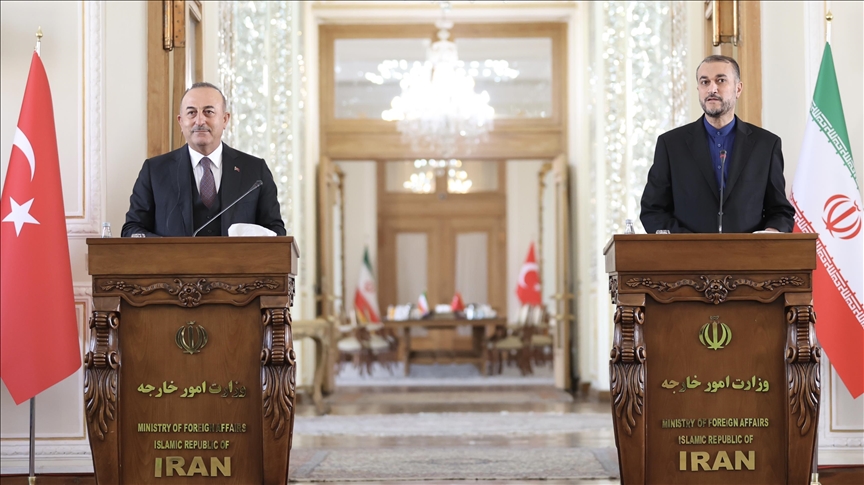Within the past decade, the relations between two players have been influenced by a number of regional factors such as Arabic-Islamic revolutions, Syrian developments, Kurds plight, Turkey’s relations with the Zionist regime, the U.S. and European countries as well as Southern Caucasus crisis have been subjected to ups and downs but have been growing an on-going trend.
Unlike the pessimistic views that attempt to place Iran and Turkey vis-à-vis each other, beyond the neighborly relations between the two countries, and due to profound historic, religious, civilization as well as cultural commonalities, the parties enjoy to have exclusive capacities in further expansion and developing their relations.
Differences of opinion that exist in relations between the two countries on some regional issues which, of course, is natural and never mean to ignore common interests and areas of cooperation. The recent trip made by Mevlut Chavush Oghlu, Minister of Foreign Affairs of Turkey to Tehran, in a situation when the Southern Caucasus crisis has damaged to some extent the trustworthy relations of the two countries indicated that the two sides continue to enjoy having suitable grounds to expand their bilateral cooperation that can promote to comprehensive strategic partnership level like those of Tehran’s relations being formed with Beijing and Moscow.
The presence of Chavush Oghlu in Tehran was an important initiative that can be considered as a meticulous and smart measure, amid the developments taken place in the Southern Caucasus crisis and in the middle of movements of some regional and trans-regional players to weaken Tehran-Ankara relations, that indicates contrary to doubtful outlooks that exist, Turkey and the Islamic Republic of Iran are thinking about new horizons and strategies in their bilateral relations. When the Foreign Minister of Turkey in the course of the joint press conference with his Iranian counterpart used a metaphor to the famous Iranian poet Sohraab Sepehri and his poem called where the friend’s house is?” and he named Tehran as the friend’s house of Turkey, it was not incidental. The meaning of the keyword friend’s house that was used by Chavush Oghlu is understood when we come to know destruction and weakening of Iran and Turkey relations as two important regional powers, has always been one of the targets of the Zionist regime, the U.S. and some countries of the region.
Obviously, the Islamic Republic of Iran and Turkey have differences of opinion on some issues. Modality and substance of activity of the two countries in Syrian developments has proved to be the most important difference during the past ten years which was managed through the sagacity of both parties.
Water reservoirs and particularly Karakurt Hydro Plant dam that has reduced 1.6 billion cubic meters of Aras River and has caused damage to a part of in Iran environment along with water storage and completion of the Ilisu dam on Tigris River which leads to the intensification of dust crisis and destruction of agricultural lands in some regions in Iran, is the next issue of dispute between Turkey and the Islamic Republic of Iran.
The next issue of tension and divergence between the two countries relates to the developments of the Republic of Azerbaijan and Turkey’s military, security and political movements of Turkey in the Southern Caucasus, particularly the issue of Nakhchivan corridor to Baku and other regions in the Republic of Azerbaijan. In view of its geopolitical effects, the issue has been provocative and among the red lines of our country.
The necessity to promote bilateral relations through drafting a long term and comprehensive road map was another outstanding issue which was raised during the visit of the Foreign Minister of Turkey to Tehran. Concerning this issue, both sides agreed to start working on the templated text of document on long term cooperation. The said document will probably be finalized and signed by relevant authorities of the two countries during the visit of President of Turkey to Tehran before the mid-March 2022.
Attempts made by the two countries to formulate the road map of long term cooperation which is due to be signed by both parties in the course of the next visit of President Erdogan to Tehran, can open a new chapter in relations between the Islamic Republic of Iran and Turkey after a five year period accompanied by ups and downs.
When the document signed, it will bring desirable interests to both parties in economic field and will cause qualitative and quantitative growth in trade and commercial relations between Iran and Turkey. Trade potential between Iran and Turkey amounts $ 30 billion which has remarkably reduced to $9-10 billion within the past several year due to a number a reasons specially the U.S. sanctions. Improving infrastructures such as facilitating the activity and cooperation of private sectors, fostering the mutual relations through sorting out the present disputes and lifting the sanctions are three important components to promote trade relations to $ 30 billion and even beyond the figure.
Potentials and capacities that exist in relations between Iran and Turkey have not been exploited optimally and properly due to a number of reasons. In a minimum expectation, long term cooperation document can manage the security bottlenecks, cause adjustment in confrontation and dispute atmosphere between the two countries, which will be of strategic importance for correction of diverging behaviors and creating stability in the region related to the important dossiers that exist. This will also be effective in making new opportunities and capacities as well as common understanding about mutual national and regional interests through updating the data, decisions and coordination on macro-strategies in relations between the two countries.










0 Comments